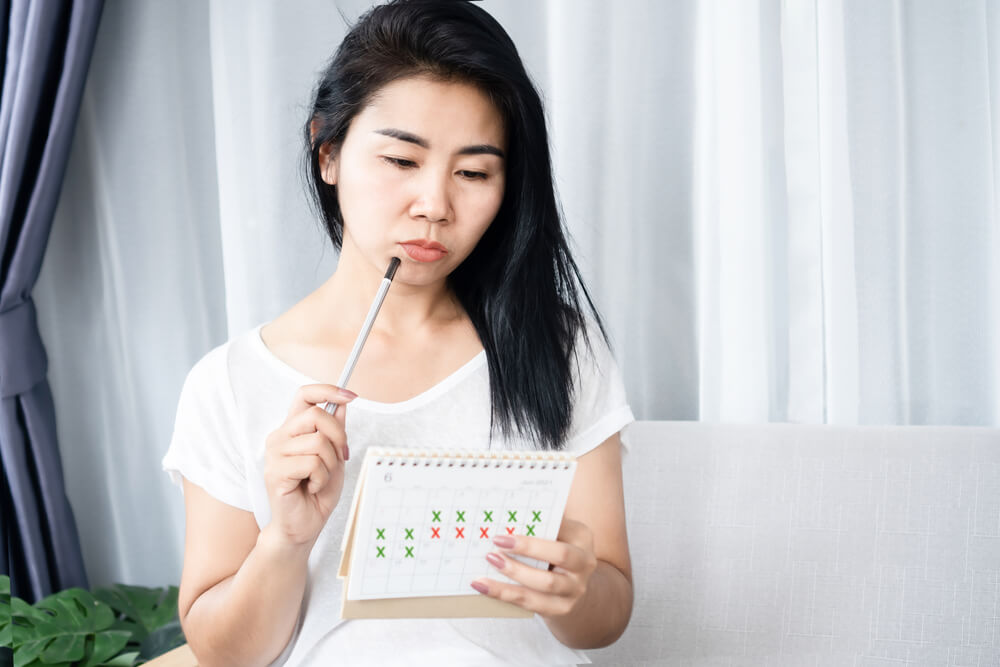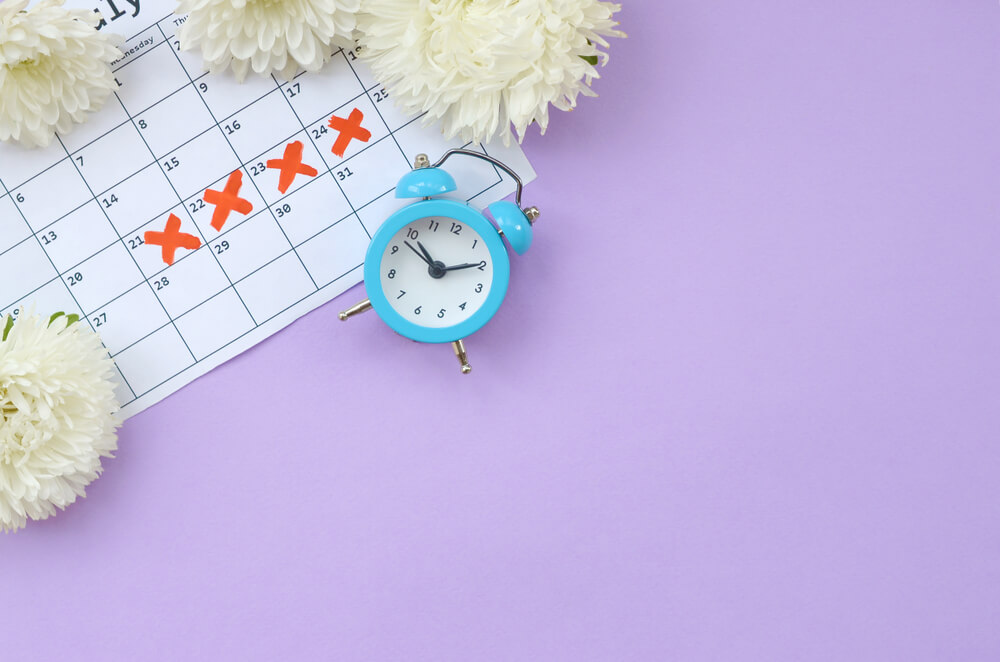Every woman in the world has probably experienced some irregularity with their menstruation cycle at some point in their life. Sometimes, irregular periods are normal and don’t have to be a symptom of any issue, but they are worth checking out. We at Woman’s Care of Bradenton recommend keeping close track of your period. The length of a menstruation cycle can vary, and it differs from woman to woman. However, when the cycles last shorter than 24 or longer than 38 days, this is a sign of irregular periods. Obstetrics and gynecology in Bradenton, Florida, advise getting an appointment if you notice such irregularities.
According to gynecologists, it is perfectly normal to have different lengths of the cycle in some months, especially if hormonal disbalance occurs, including breastfeeding, puberty, or getting close to menopause. Also, there are other factors that can impact your menstrual cycle and cause delayed periods, such as some medication, stress, and physical and mental health issues, and those occurrences are also perfectly normal and expected. However, if it happens for the menstruation problem repeats itself month after month, you should consult your gynecologist.
The Importance of Proper Care
In order to preserve the good health of her reproductive system, every woman should understand how proper care and regular checkups are important. The entire well-being of a woman can impact the regularity of her menstruation, and that is why women know their bodies well.
What’s more, regular checkups with doctors will help maintain good health and prevent any health issues. Also, if you go for regular pap smears, ultra-sound, and examinations, you can catch any infections, cancer, and other issues early on and get proper treatment.
Irregular Periods – What are They?

In order to notice any menstruation problem and irregularities, you have to keep track of the entire menstruation cycle and its length. You can be sure that you have irregular periods if you notice frequent changes in starting and ending days of your period, i.e., the gap days when you don’t have your periods. However, it is important to keep in mind that it is often normal for the period to come in or end soon or late. Statistically, the cycle lasts up to 28 days, and it can vary in length, but you know your body better, so keep close track.
After puberty, when an irregular period is normal and expected, women will develop a regular cycle. Even though it is not uncommon for it to vary, constant irregularities may tell you that there are some bigger issues.
Irregular and Delayed Periods – What are the Causes?
Irregular periods, or medically oligomenorrhea, can happen for a lot of reasons. Many do relate this occurrence to hormone levels and changes. Three hormones are responsible for cycle regulation – a follicle-stimulating hormone, progesterone, and estrogen. And if something happens to affect these hormones and their levels in the body, irregular or delayed periods are the results.
An occasional menstruation problem or delayed periods are common, and they are usually not something to be concerned about. The factors that can contribute to the irregular menstruation cycle include:
- Natural hormonal shifts – puberty or menopause
- Birth control
- Stress
- Endurance exercise
- Changes in weight – sudden gain or loss
- Early pregnancy
- Medical conditions – PCOS, thyroid gland issues.
So, if you notice occasional delays and irregularities, you might want to examine some of these options.
A Closer Look at Potential Causes
Delayed periods are often common due to minor and not so frequent changes in your lifestyle, habits, or major events.
One such example is natural hormonal changes. The first and obvious is puberty. During these years, a woman’s body undergoes some significant changes, and it may take some time for your hormones to establish a pattern and regular menstruation. So, it is perfectly okay to have irregular periods during puberty.
Another cause is childbirth and breastfeeding. After a woman has given birth to a baby and is breastfeeding, once again, hormones need time to go back to normal. As a matter of fact, breastfeeding stops the ovulation process, further stopping your periods.
Another significant cause occurs with aging when a woman is entering menopause. The early stage of menopause is perimenopause, and this is when you may notice menstruation problems and irregularities. During perimenopause, hormone levels begin to decline, and the period between periods increases until they cease entirely.
Furthermore, a sort of menstruation problem could occur due to birth control. When you start taking contraceptives, it stops your ovulation. More precisely, a woman does not have a true period while on birth control. Instead, some women don’t have a period at all, while some have withdrawal bleeds similar to a period.
Additionally, stopping birth control can cause irregular periods. When you stop affecting your hormones and ovulation, you may experience a few irregular periods. This is only because your body needs time to establish a normal hormonal cycle again.
Some Underlying Conditions May be the Cause
Even though irregular periods can be common, still, there are some underlying health conditions that may be causing the issues.
Polycystic Ovary Syndrome
PCOS is, unfortunately, more frequently present in women now. This condition means that small, fluid-filled sacs (cysts) develop in your ovaries. PCOS can further cause an increase in testosterone levels, which, as a result, delay ovulation or completely prevent it, as well as the entire menstrual cycle.
Some other symptoms of PCOS:
- Excessive hair growth
- Acne
- Insulin resistance affects your weight
- Depression
- Trouble conceiving
Eating Disorders Could be the Cause, too
Anorexia, bulimia, and binge eating disorder could also be the cause of delayed periods, irregular ones, or even prevent them totally. However, women who have experienced severe and sudden weight loss are more likely to experience this. To recognize any type of eating disorder, pay attention to the following clues:
- Avoiding whole food groups from the diet when unnecessary, such as carbohydrates
- Restriction of food or calories in extreme ways
- Fasting after which you binge eat
- Eating a lot when you’re not hungry
- Going to the bathroom immediately after any meal
People who exercise too frequently and too much may also experience irregular menstrual cycles. This issue when you find it hard to stop exercising is called compulsive exercise.
Endometriosis – An Overlooked Issue
When it happens that the cells that should grow in the uterus start growing outside of it, it is called endometriosis. These cells create the uterine lining, which thickens and sheds during each period. When these cells grow somewhere else, this whole process causes significant pain. The symptoms of endometriosis include:
- Too heavy periods
- Passing large blood clots
- Bleeding between two periods
- Problems getting pregnant
Thyroid Gland Diseases
Thyroid gland issues can be hard to notice, especially if they are in the early stages. The thyroid produces hormones that affect almost everything in our bodies, including our metabolism, heart rate, and many other functions. Additionally, it helps control when ovulation will start and the regularity of the periods.
There are two types of thyroid diseases. One is hyperthyroidism when thyroid hormone is excessively produced, and the other is hypothyroidism when it is not produced enough. Diseases of this gland can affect periods, how heavy or light they are, and their frequency. In some people, thyroid diseases can even stop ovulation.
Symptoms of hyperthyroidism:
- Racing heart
- Anxiety
- Irregular periods
- Trouble sleeping
- Feeling hot
- Unexplained weight loss
Symptoms of hypothyroidism:
- Irregular periods or infertility
- Fatigue
- Unexplained weight gain
- Dry skin
- Cold sensitivity
- Hair loss
- Depression
Thyroid diseases are treatable, especially when caught early on. When it comes to hypothyroidism, you may have to intake thyroid hormone and to treat hyperthyroidism, you can rely on radioactive iodine.
Other Conditions That May Cause Irregular Periods
Besides the above-mentioned health issues, there are other conditions that may affect how regular and healthy your period is. These include:
- Type 1 diabetes
- Cushing’s syndrome
- Congenital adrenal hyperplasia
- Primary ovarian insufficiency
- Hormone-secreting tumors
Possible Complications Caused By Irregular Menstruation Cycle

Even though irregular periods are often not an alarm that something is wrong, if they are long-term, they may contribute to the increased risk of other health issues. These include:
- Iron deficiency anemia – way too heavy and frequent bleeding can cause anemia.
- Infertility – irregular periods may be the result of a lack of ovulation and no fertile eggs.
- Osteoporosis – since ovulation is a source of estrogen, lack of ovulation can increase the risks of osteoporosis since estrogen keeps our bones healthy.
- Endometrial hyperplasia – when irregular periods are left untreated for longer periods of time, the risk of endometrial hyperplasia increases, which can lead to endometrial cancer.
- Cardiovascular diseases – lack of estrogen can raise the risks of cardiovascular issues and diseases.
When to Talk to Your Doctor?
If you are certain that occasional irregular periods are caused by stress, puberty, and other hormonal changes, you don’t have to see a doctor if you don’t want to. However, if these are persistent and raise concerns, there are signs that you need to visit your doctor. These include:
- Irregular cycle and you are not older than 45
- Too frequent periods
- Your periods last more than seven days
- A too big a difference between your shortest and longest menstrual cycle (at least 20 days)
- Troubles conceiving
Even if you do notice some of these irregularities, it doesn’t necessarily mean that there are any issues. However, these are perfect situations to pay a visit to your doctor and do a thorough checkup.
Regular periods are a sign that a woman’s body is healthy and strong. However, there are many big or small issues that may cause a lack of period or different lengths of menstrual cycles. That is why it is important to keep close track of your cycles and book your next appointment.
Have you experienced irregularities in your menstrual cycle? If you are concerned, make your appointment soon.


